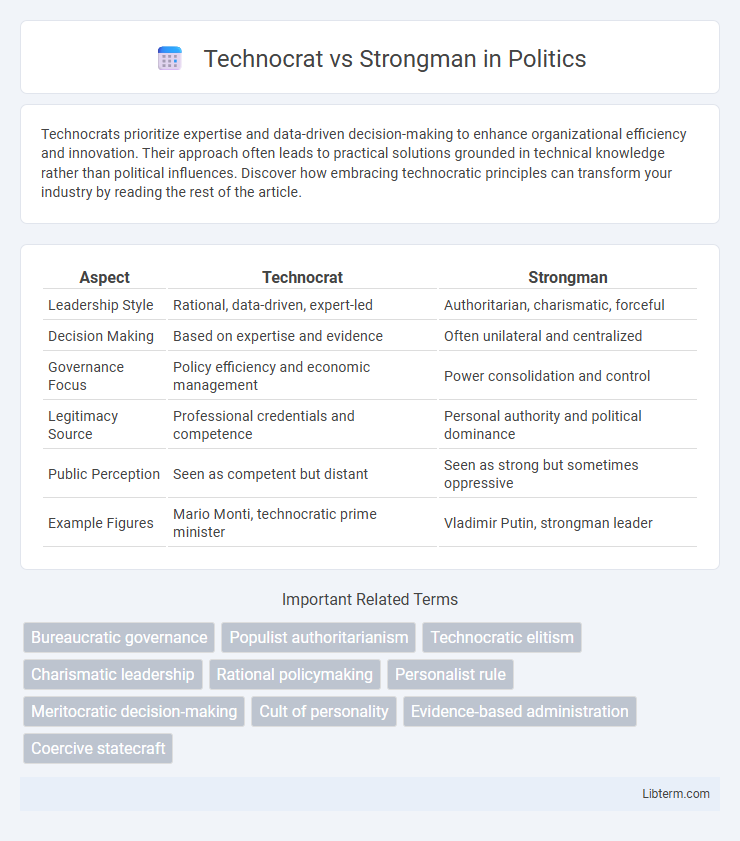Technocrats prioritize expertise and data-driven decision-making to enhance organizational efficiency and innovation. Their approach often leads to practical solutions grounded in technical knowledge rather than political influences. Discover how embracing technocratic principles can transform your industry by reading the rest of the article.
Table of Comparison
| Aspect | Technocrat | Strongman |
|---|---|---|
| Leadership Style | Rational, data-driven, expert-led | Authoritarian, charismatic, forceful |
| Decision Making | Based on expertise and evidence | Often unilateral and centralized |
| Governance Focus | Policy efficiency and economic management | Power consolidation and control |
| Legitimacy Source | Professional credentials and competence | Personal authority and political dominance |
| Public Perception | Seen as competent but distant | Seen as strong but sometimes oppressive |
| Example Figures | Mario Monti, technocratic prime minister | Vladimir Putin, strongman leader |
Understanding Technocrats: Definition and Role
Technocrats are experts in specific fields such as economics, engineering, or public administration who govern based on technical knowledge and data-driven decision-making. Their role emphasizes efficient management, evidence-based policies, and long-term planning, often prioritizing expertise over political considerations. Unlike strongmen who rely on personal authority and charisma, technocrats seek to optimize institutional performance through specialized skills and rational governance.
Who Is a Strongman Leader? Key Characteristics
A strongman leader exercises centralized power, often ruling with authoritarian control and minimal opposition. Key characteristics include a focus on personal authority, suppression of dissent, and prioritization of order and stability over democratic processes. This leadership style frequently involves charisma, populist rhetoric, and the use of state resources to maintain dominance.
Historical Examples of Technocrats in Power
Technocrats have held power in various historical contexts where expertise and technical knowledge were prioritized over political ideology, such as Italy's Mario Monti, who led a technocratic government during the European debt crisis to implement economic reforms. Another prominent example includes Lee Kuan Yew of Singapore, whose technocratic leadership transformed the nation into a global financial hub through pragmatic governance and policy innovation. These leaders exemplify how technocracy emphasizes problem-solving skills and specialized knowledge to guide state affairs efficiently, contrasting with the centralized, authority-driven control seen in strongman regimes.
Notable Strongman Leaders in Recent History
Notable strongman leaders in recent history include Vladimir Putin of Russia, Xi Jinping of China, and Recep Tayyip Erdogan of Turkey, known for centralized power and authoritative rule. These leaders often bypass traditional democratic institutions to enforce policies through direct control and political influence. Their governance contrasts with technocrats who emphasize expertise and data-driven decision-making over personal authority.
Governance Style: Technocrat Pragmatism vs Strongman Authority
Technocrat governance emphasizes pragmatic decision-making based on expertise, data, and evidence, prioritizing efficient policy implementation to address complex societal issues. In contrast, strongman governance relies on centralized authority and charismatic leadership, often using coercion and decisive control to maintain order and enforce policies. While technocrats aim for systemic improvements through technocratic competence, strongmen focus on consolidating power and commanding loyalty to achieve political goals.
Public Perception and Trust in Technocrats and Strongmen
Public perception often favors technocrats for their expertise, data-driven decision-making, and perceived neutrality, which enhances public trust in their governance. Strongmen, while sometimes admired for decisiveness and control, frequently face skepticism due to authoritarian tendencies and potential undermining of democratic institutions. Trust in technocrats correlates with transparency and competence, whereas trust in strongmen depends largely on their ability to maintain order and deliver quick results.
Policy Outcomes: Efficiency vs Decisiveness
Technocrat governance often leads to efficient policy outcomes by emphasizing expertise, data-driven decision-making, and long-term planning, reducing errors and waste. Strongman rule, in contrast, prioritizes decisiveness, swiftly implementing policies through centralized power but risking oversight and inefficient resource allocation. Efficiency in technocratic systems enhances sustainable development, while strongman decisiveness can produce rapid short-term results with potential instability.
Technocrat vs Strongman: Impacts on Democracy
Technocrats prioritize expertise and evidence-based policymaking, often enhancing governance efficiency and promoting democratic stability through informed decisions. Strongmen centralize power, frequently undermining democratic institutions by limiting checks and balances and suppressing dissent. The tension between technocrats and strongmen shapes the resilience of democracy, influencing political transparency, civil liberties, and institutional accountability.
Global Trends: Rise of Technocrats and Strongman Leaders
Global trends reveal a significant rise in technocrat leaders who emphasize data-driven policies and expert governance, contrasting with strongman figures who rely on centralized authority and charismatic control. Countries like Singapore and Germany exemplify technocratic governance through their effective management and policy precision, while nations like Russia and Turkey showcase strongman leadership marked by power consolidation. This shift reflects growing public demand for both stability amid geopolitical tensions and competence in addressing complex challenges such as economic crises and public health.
The Future of Leadership: Technocracy or Strongman Rule?
The future of leadership hinges on the debate between technocracy and strongman rule, where technocrats emphasize data-driven policy and expertise, fostering sustainable development and institutional stability. Strongman leaders prioritize centralized authority and swift decision-making, often at the expense of democratic checks and balances, appealing in times of crisis or political instability. Analyses of global trends reveal increasing calls for technocratic governance in complex societies, yet the allure of strongman figures persists in regions with fragile institutions and security challenges.
Technocrat Infographic

 libterm.com
libterm.com